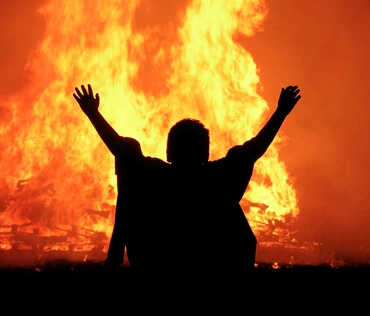Apocalypse Revealed # 501
501. And their bodies will lie in the street of the great city. (11:8) This symbolically means that these two essential elements of the New Church have been utterly rejected by people inwardly caught up in the doctrinal falsities connected with justification by faith alone.
The bodies of the two witnesses symbolize the two essential elements of the New Church, namely, an acknowledgment of the Lord as the only God of heaven and earth, and conjunction with Him by a life in accordance with the Ten Commandments (nos. 490ff.). The street of the great city symbolizes doctrinal falsity connected with justification by faith alone - the street symbolizing falsity, as we shall see next, and the city symbolizing doctrine (no. 194). It is called a great city because the doctrine is the prevailing doctrine throughout the Protestant Reformed Christian world among the clergy, though not in the same way among the laity.
Streets in the Word have almost the same symbolic meaning as ways, because streets are a city's ways. Still, streets symbolize doctrinal truths or falsities, because a city symbolizes doctrine (no. 194), while ways symbolize a church's truths or falsities, because the earth symbolizes the church (no. 285).
[2] That streets symbolize doctrinal truths or falsities can be seen from the following passages:
Justice has been rejected, and righteousness stands afar off, for truth has stumbled in the street, and rectitude cannot enter. (Isaiah 59:14)
The chariots raced madly in the streets, they rushed in every direction in the town squares. (Nahum 2:4)
In the days of Jael, the ways were deserted... The town squares were deserted... in Israel... (Judges 5:6-7)
How the glorious city is forsaken...! Therefore her young men shall fall in her streets... (Jeremiah 49:25-26, cf. 50:30)
Those who ate delicacies are devastated in the streets... Darker than black is the appearance (of the Nazirites); they go unrecognized in the streets... They wandered blind in the streets... They tracked our steps so that we could not go into our streets. (Lamentations 4:5, 8, 14, 18)
I will cut off nations, their corners will be devastated; I will make their streets desolate... (Zephaniah 3:6)
(After) sixty-two weeks, the street (of Jerusalem) shall be built again..., but in distressful times. (Daniel 9:25)
...the street of the city (New Jerusalem) was pure gold, like transparent glass. (Revelation 21:21)
In the middle of its street... on this side and that, was the tree of life, which bore twelve fruits... (Revelation 22:1-2)
And so on elsewhere, as in Isaiah 15:3; 24:10-11; 51:20.
As streets symbolize the church's doctrinal truths, therefore they taught in the streets (2 Samuel 1:20). And we are told,
We ate and drank in Your presence, and You taught in our streets. (Luke 13:26)
For this reason also hypocrites prayed on street corners (Matthew 6:2, 5). And for this reason the master of the house in Luke 14:21 ordered his servants to go out into the streets and squares and bring people in.
For the same reason, too, anything false or falsified is called mire, filth and excrement in the streets (Isaiah 5:25; 10:6, Micah 7:10, Psalms 18:42).
Prophets who prophesied falsely were cast out into the streets of Jerusalem, and no one buried them (Jeremiah 14:16).
Fire

Fire, in the spiritual sense, can mean either love or hatred depending on the context, just as natural fire can be either comforting in keeping you warm, or scary in burning down your house. Our language reflects this, too -- we use concepts like a smoldering hatred or a burning love. So fire signifies a love, either a good love of the neighbor and to the Lord, or, in a bad sense, selfish love of oneself that, if unchecked by conscience, leads to hatred of anyone that opposes it.






